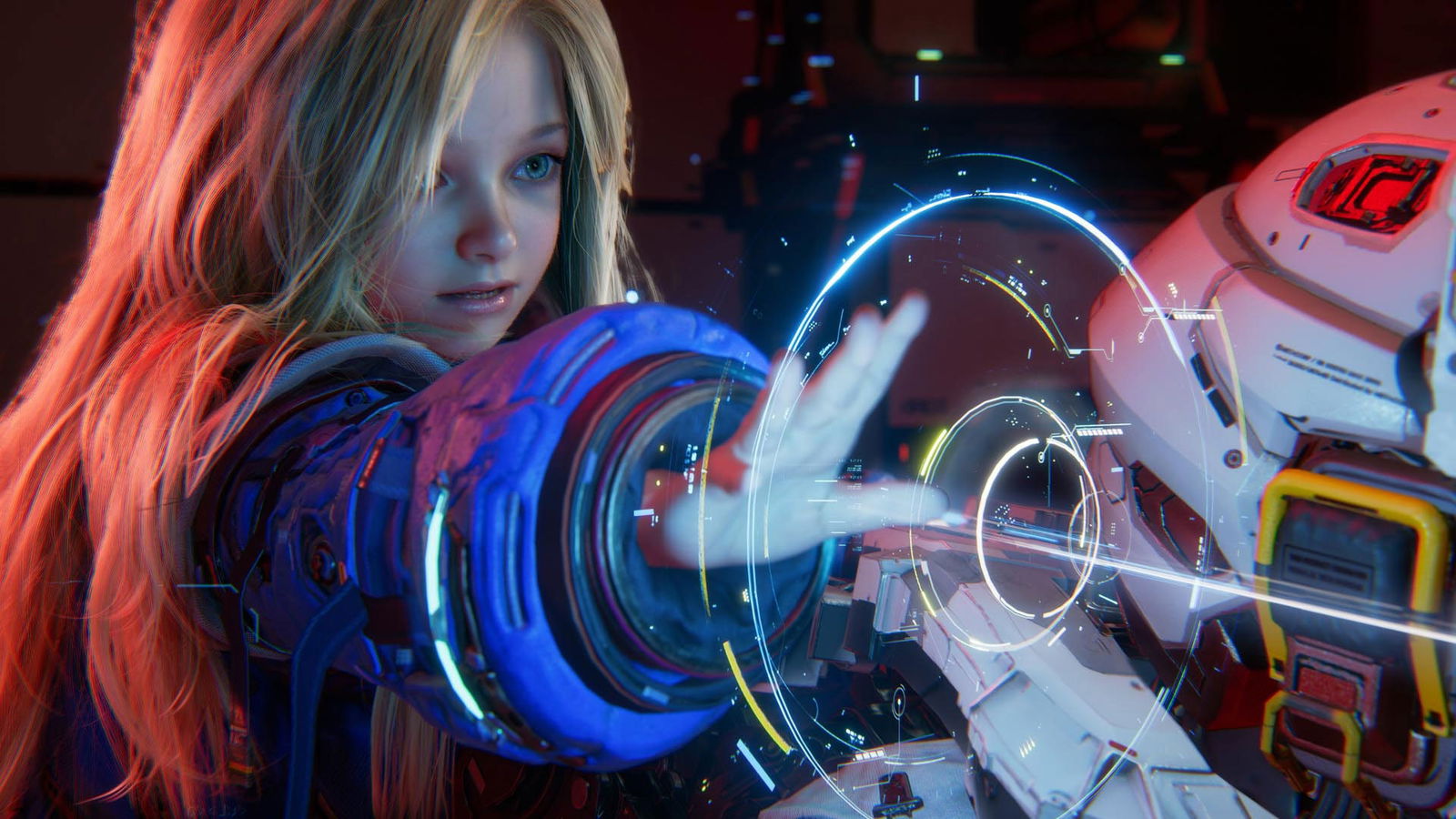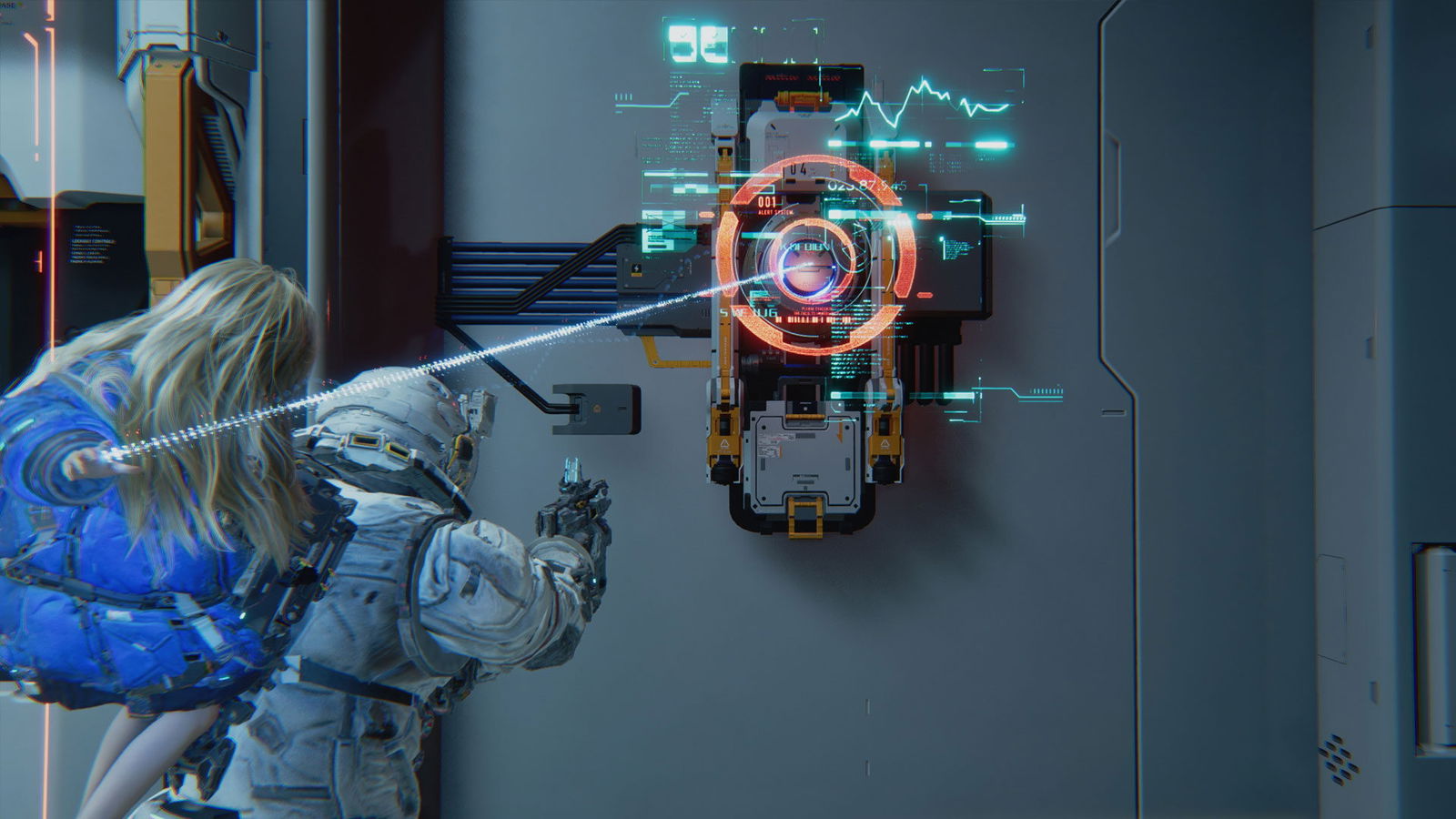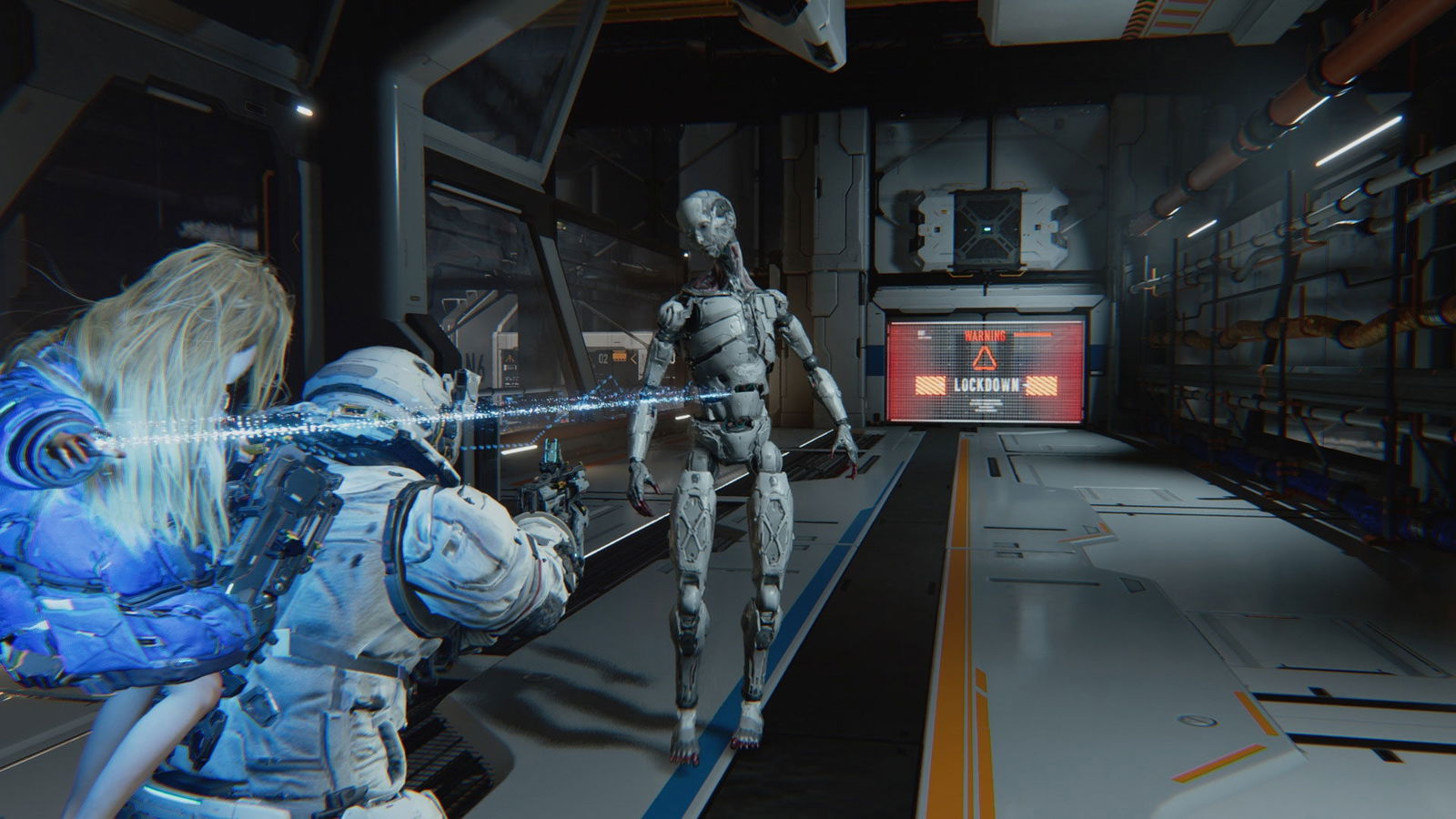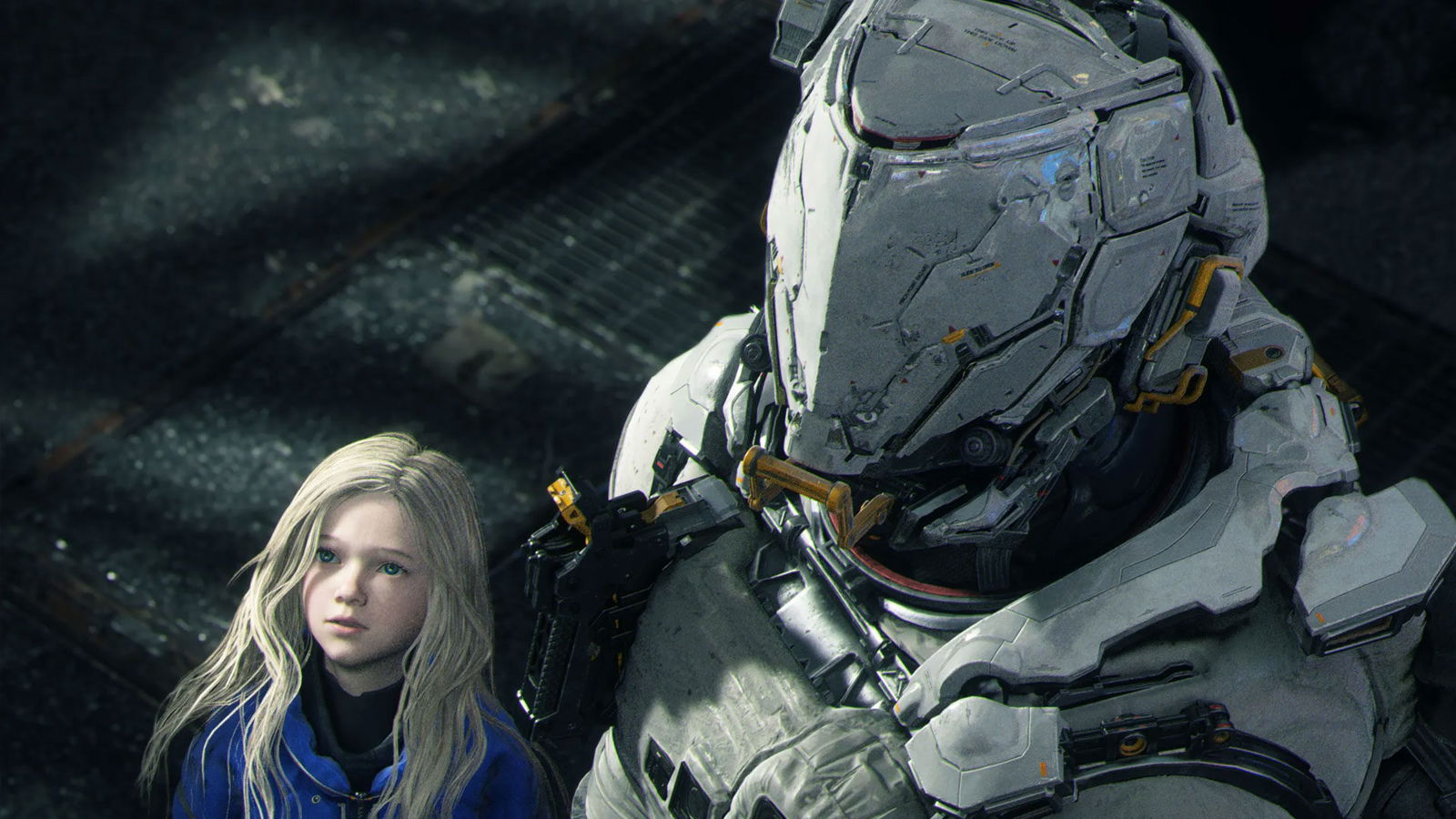First announced back in 2020, news around Pragmata had been very limited—until it made its presence known at Summer Game Fest 2025 and gave the press some hands-on time with the title. What initially looked like an interesting concept has finally manifested into something intriguing, unique and potentially very exciting. While I was initially skeptical about what Pragmata could be and how it might work in practice, at least based on my 20 minutes with the title, I’m excited to see more and experience what the game has to offer when it launches in 2026.
While the game has been somewhat shrouded in mystery, this year we’ve gotten a bit more detail about what’s going on and what makes the setting so compelling. Waking up after some sort of incident, you take control of Hugh Williams, who finds himself with no idea what’s happening—or why everything seems determined to kill him. On your mission, you’re aided by Diana, an android in the form of a young girl, who you quickly discover can hack into other robots and machinery around the lunar base, making them much easier to take down.

While a relatively simple concept, Pragmata does a good job of setting the stage and world early on, giving you a reason to not only care about the characters but also to progress through the story. The mystery around the lunar research station provides just enough breadcrumbs to keep you pushing forward, wanting to find out what’s going on, who Diana is, and how she fits into the story of the station. From the demo, only a small amount was teased, so it’s hard to say where things are going, but I’m intrigued just enough to want to explore more of the game’s world.
Thankfully, things start out strong in the demo, giving you a glimpse of the type of character Hugh is when he’s faced with a killer AI android that may be trying to kill him—and Diana. Even after firing rounds into the robot, it keeps coming—at least until Diana shows her potential and hacks the robot, taking down its defences and showcasing one of the most unique aspects of Pragmata: the need to hack enemies while you’re actively engaged in combat.
“Pragmata does a good job of setting the stage and world early on, giving you a reason to not only care about the characters but also to progress through the story.”
Hacking is the big selling point in Pragmata, and this is where the overall gameplay structure and focus start to make sense. On the surface, hacking while fighting various robots and androids sounds like it would be a tedious concept. Yet Capcom has managed to blend third-person combat with the hacking system in a way that not only works but is genuinely fun. When you first jump into combat, you’ll quickly find out how ineffective simply shooting the enemies around the lunar research station is. Each attack barely makes them flinch, shaving off only a sliver of health, compared to how much damage they do to you with a single hit.

It’s here that the hacking system comes into play. Once Diana is on your back and assisting in the process, you’ll be introduced to a relatively simple hacking mini-game that can be completed while you’re actively fighting. You must connect the starting point to the goal point on a grid. While the mechanic is easy at first, it quickly begins introducing power-ups and other elements into the mix, and that’s all before you’re forced to juggle multiple enemies at once. Even as the difficulty ramps up, Pragmata does a good job of making it all work in a way that feels oddly rewarding.
Things slow down slightly during hacking, giving you the precious seconds needed to perform the action without being killed in the process. But even with this brief reprieve, it never loses the frantic feel of needing to manage everything thrown at you, all while simply trying to survive. It’s a unique concept that I didn’t expect to enjoy, but Capcom has done a solid job making it feel fluid and fully integrated into the gameplay loop.
Thankfully, there are various pickups scattered throughout the game world that help make the challenge more manageable. Different guns can either boost your attack power or slow enemies, making the act of juggling combat and hacking feel much more achievable.

Now, I’ll take the time to admit—despite the 20 or so minutes with the demo—that, beyond a few sections with three or so different obstacles, most of the time it felt relatively manageable. The few enemy types I encountered were all relatively easy to take on, and even when Pragmata introduced some of the more challenging robots, it never felt overwhelming. While everything worked well, I would have loved to see the formula mixed up a bit more. As effective as it was, the gameplay quickly started to feel a bit repetitive. I’m hoping Capcom can find new ways to push the player in the full experience.
I was also a bit disappointed that the demo stopped just as I entered the boss area. As I mentioned, I had started to feel the gameplay loop was becoming repetitive, so I was excited to see how a boss encounter could unfold. Sadly, beyond being teased that a boss would appear around the 20-minute mark, I didn’t get to see how the core gameplay and hacking mechanics would translate into a more challenging encounter. Based on the level of polish shown so far, I’m hopeful that Capcom has some new ideas that will expand on the mechanics we’ve seen, but that has yet to be seen.
Beyond those concerns, the team at Capcom has done a great job blending the systems and traversal into something that feels cohesive. The ability to jump and use your suit to hover in certain areas gives the space station a far more vertical feel than I’ve seen in other third-person action games. It all felt well polished and provided a solid sense of how the final game might play when it’s released. Even the environmental puzzles scattered across the short 20-minute demo helped give a clearer picture of what Pragmata is—and why gamers should still be paying attention after its longer-than-expected development cycle.

I still have my reservations about Pragmata, with many questions left unanswered even after spending some hands-on time with the title. But what I’ve seen so far has me intrigued. The gameplay loop appears to offer a fresh level of challenge and reward, with hacking playing a vital role in overcoming the numerous obstacles that lie in wait throughout the whole experience.
What Capcom has shown already works well. The team still has plenty of work ahead before the game’s 2026 release date, but if the demo is indicative of the final product, I’m more excited than ever to see how it all unfolds. I’m eager to explore the mysteries hidden beneath the surface of this lunar research station—and more curious than ever to find out how Diana fits into the story.




